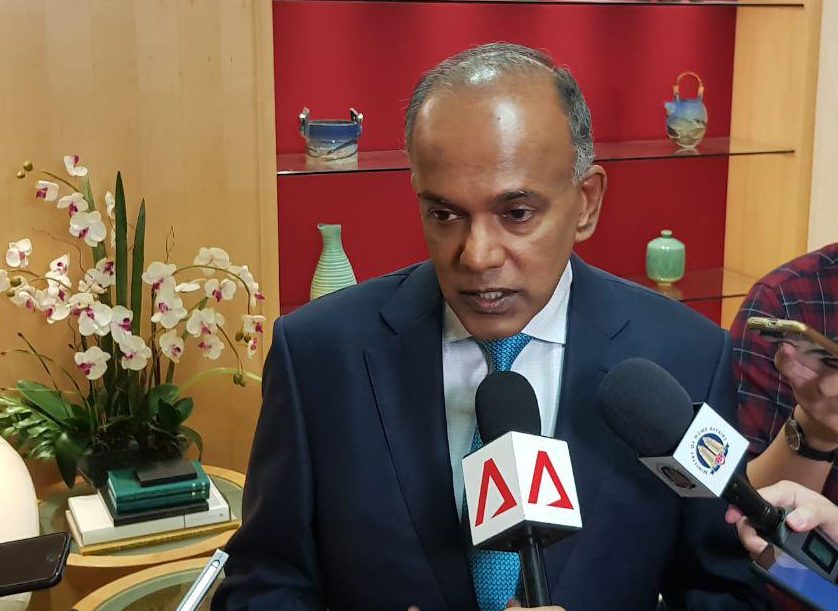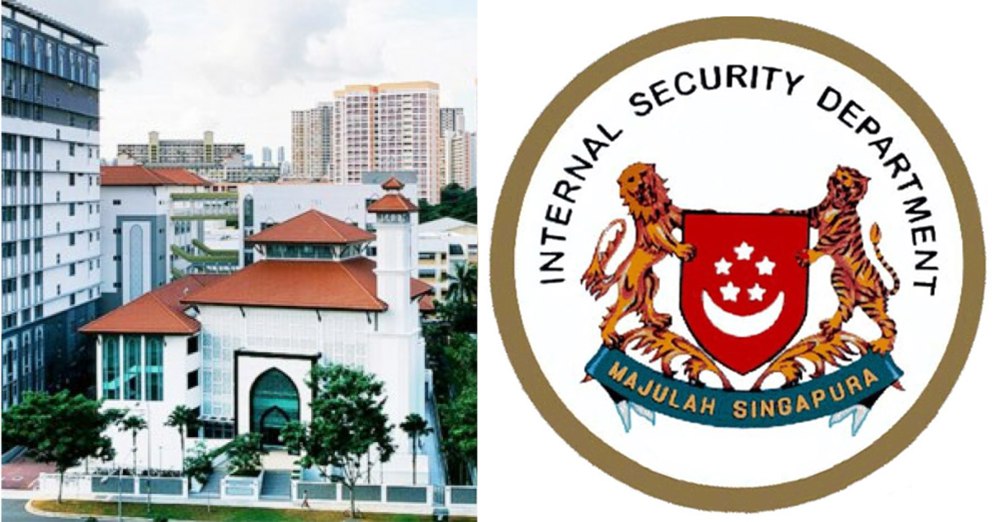A Singaporean government-accredited Islamic teacher and his student were slapped with restriction orders under the Internal Security Act (ISA) near the end of 2018 for propagating extremist and segregationist religious views against non-believers.
According to a statement from the Ministry of Home Affairs (MHA) on Wednesday, freelance religious teacher Murad bin Mohd Said, 46, had his educational accreditation from the Islamic Religious Council of Singapore (MUIS) cancelled in May 2018, and was placed on a restriction order that started on Dec. 5, 2018.
One of his students, 56-year-old Razali bin Abas, was arrested under the ISA in Sep. 2018, and a month later was issued a restriction order as well.
Taught that it was compulsory to kill apostates, disregard S'pore's secular laws
The MHA said Murad taught his students the following:
- It was compulsory to kill apostates — defined as non-believers, Sufis, Shi'ites and Muslims who have renounced Islam or disregard text or rulings from the Quran or Sunnah.
- Muslims were allowed to defend themselves by waging "armed jihad" against "infidels who persecuted" them.
- They should withdraw from Singapore's secular society — disregard secular laws and adhere to the rulings of Syariah law instead.
These, said the MHA, promote violence and views "detrimental to the cohesion of Singapore's multi-racial and multi-religious society", and also "undermine Singapore's secular nation-state system".
Even after his accreditation was stripped, MHA said Murad continued publishing his segregationist views online.
Student attended Murad's classes since 2012
Murad's student, Razali bin Abas, works as a technician. According to the MHA, the 56-year-old was introduced to Murad and started attending his classes almost seven years ago, when he became disillusioned with his lifestyle and turned to religion.
MHA said Razali then became more susceptible to violent and radical influences he encountered on social media, and over time, he became convinced that it was legitimate to kill those he felt were "oppressors of Islam" — these, the MHA said, include non-Muslims and Shi'ites.
Razali then sought out people who had "militant-looking" profiles on Facebook and hailed them as "heroes", MHA said, because they were making sacrifices he couldn't himself make, and he also supported armed violence and terrorist groups like al-Qaeda.
Shanmugam: "Absolute no-no... crosses many red lines"
 Photo by Matthias Ang
Photo by Matthias Ang
Speaking about this case at a press briefing on Wednesday afternoon, Minister for Home Affairs K Shanmugam spoke strongly against what Murad had taught:
"...if you have a religious teacher who preaches violence and you tell your students it's okay to go and kill non-Muslims, that's an absolute no-no. It crosses many red lines."
He said the government's stance on this is not restricted to Islam, too — in case there was any doubt that was the case:
"When you advocate violence, when you preach violence using your religious role, we will act. It is not restricted to any particular religion, I think everybody in Singapore understands... What you can be confident about is anyone who espouses or is thinking of doing violence to others would be of interest to the Internal Security Department (ISD)."
The minister clarified that Murad's accreditation was revoked by MUIS when MUIS deemed his teaching to be deviant, unacceptable and contrary to the values of Singapore's society. The month-long lag time was when the ISD deemed him to have become a threat to national security.
He said also that Murad's ability to secure accreditation is not necessarily a failure on MUIS's part to effectively vet its teachers — instead, he noted that people's beliefs can change over time, and it is possible Murad did in this case.
"I think MUIS ought to be commended, because you have a system of certification that works well by and large. They have revoked the certifications of others as well. When someone is going off, and his teachings are inimical to society, MUIS has taken action."
Responses from other authorities
MUIS published its own statement on Jan. 16, noting the importance of remaining vigilant against extremism.
Minister-in-charge-of Muslim Affairs Masagos Zulkifli posted a message on his Facebook about the restriction orders.
He said that the challenge of countering radicalisation continues, and commended the swift action taken by our security agencies.
He added, "However, the actions of a misguided few must not be allowed to tar the good name of our community."
You can read it below:
Minister for Culture, Community and Youth Grace Fu also put up a Facebook post about the restriction orders.She said the two cases underscored the "the continued need for vigilance" and added that Murad and Razali "do not represent our Muslim community".
She further stated "we must continue to stand together with our Muslim friends, to protect the deep friendships and harmony between our races and religions in Singapore."
The Asatizah Recognition Scheme
In 2004, the Islamic Religious Council of Singapore (MUIS) formed the Asatizah Recognition Board, as a way to provide accreditation for asatizah.
Asatizah is the plural term for ustaz and ustazah, the Arabic word for a religious scholar or teacher — so you can think of these guys as authoritative figures on Islamic teaching in Singapore who are recognised as legitimate by our government. Asatizah are important figures in Singapore's Muslim community, as they provide sound religious guidance.
In a modern, multi-cultural society like Singapore, it's important for asatizah to provide religious guidance in line with our country's values of multiculturalism and diversity, and guard against problematic ideologies and practices.
In 2005, the Asatizah Recognition Scheme was launched, initially welcoming scholars and teachers to register themselves voluntarily.
The scheme provides recognition for religious teachers in Singapore, and is intended to serve as a credible source of reference for the Muslim community here.
According to MUIS:
"Recognition is granted only to qualified Islamic religious teachers and scholars who meet the minimum standards of qualification, and are considered fit and proper to preach and teach Islamic religious knowledge."
In response to calls from Muslim community leaders for it to be made mandatory for all asatizah in Singapore, then-Minister-in-charge of Muslim Affairs Yaacob Ibrahim announced in Sep. 2016 that it would be so from Jan. 2017.
Previous cases
The Ministry of Home Affairs has previously taken action against preachers who spread radical views as well as people in Singapore who have become radicalised.
In Jan. 2016, 27 Bangladeshi men working in Singapore were arrested under the Internal Security Act (ISA) for their support of the Islamic State in Iraq and Syria and their plan to engage in armed jihad overseas.
In June 2017, Singaporean extremist preacher Rasul Dahri was barred from teaching Islam in Singapore, and the nine publications he authored were also banned.
Rasul had called democracy "un-Islamic" and supported armed struggle for the establishment of an Islamic state. He had applied for the Asatizah Recognition Scheme, but was rejected.
In Oct. 2017, two foreign Islamic preachers, Ismail Menk and Haslin bin Baharim were barred from entering Singapore for spreading divisive views that would promote disharmony between Muslims and non-Muslims.
In Nov. 2017, three Singaporeans were detained under the ISA for radicalism and support for the terrorist Jemaah Islamiyah and ISIS organisations.
In Feb. 2018, a Malaysian man working in Singapore who consumed radical materials was arrested under the ISA and repatriated to Malaysia.
And most recently, in Nov. 2018, the co-founder of an Indonesian radio station that radicalised Singaporeans was denied entry into Singapore.
Top photos via MUIS Facebook page, ISD logo.
If you like what you read, follow us on Facebook, Instagram, Twitter and Telegram to get the latest updates.
